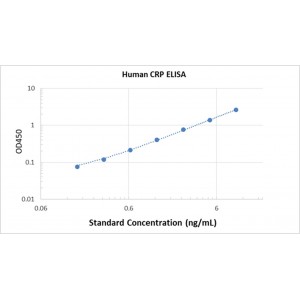 View larger
View larger
Human C Reactive Protein CRP ELISA Kit
BG-HUM10443
Human C Reactive Protein Hs ELISA KitFor research use only. Not for use in diagnostic procedures.For general protocol and instruction, please click the following links:Quantitative Elisa Kit InstructionSandwich ELISA kit general instruction
Data sheet
| Background | The levels of CRP in blood increase rapidly in response to trauma, inflammation, and infection. It is thus not a specific marker for a particular disease, but rather a widely used indicator of bacterial or fungal infection, or various inflammatory conditions, such as rheumatoid arthritis or inflammatory bowel disease. Normal levels of CRP in blood are generally less than 3 mg/L. In the case of acute inflammation or bacterial infection, CRP levels can rise dramatically, up to 10,000fold. In recent years, studies have indicated that slightly elevated CRP levels might be linked to several other disease types as well, such as cardiovascular diseases or cancer. However, the physiological connection between CRP levels and the risk of cardiovascular events or malignant tumors is not yet completely understood. |
| Alternate Names | CRP, PTX1, C-reactive protein, pentraxin-related, C-Reactive Protein |
| Assay Range | 0.156 to 10 ng/mL |
| Dilution Factors | Most serum samples we tested have sample values 100 to 5000 ng/ml but varies a lot. We suggest testing samples 1:400 to 1000 |
| Citation | 1401 |
| Product Citations | P02741 |
More info
Human C Reactive Protein Hs ELISA Kit
C-Reactive protein (CRP) has been named according to its capacity to precipitate the C-polysaccharide of Streptococcus pneumoniae. CRP is secreted in response to a variety of inflammatory cytokines, and its main biological role is the activation of the complement system and of other proinflammatory processes. More specifically, CRP binds to phosphocholine and related substances, which are widely distributed in polysaccharides of pathogens and in cellular membranes. CRP therefore recognizes a range of pathogenic targets as well as membranes of damaged and dying host cells, making it one of the key activators of the classical complement pathway.
The levels of CRP in blood increase rapidly in response to trauma, inflammation, and infection. It is thus not a specific marker for a particular disease, but rather a widely used indicator of bacterial or fungal infection, or various inflammatory conditions, such as rheumatoid arthritis or inflammatory bowel disease. Normal levels of CRP in blood are generally less than 3 mg/L. In the case of acute inflammation or bacterial infection, CRP levels can rise dramatically, up to 10,000fold. In recent years, studies have indicated that slightly elevated CRP levels might be linked to several other disease types as well, such as cardiovascular diseases or cancer. However, the physiological connection between CRP levels and the risk of cardiovascular events or malignant tumors is not yet completely understood.
The human CRP molecule is a pentamer, i.e. it is composed of five identical polypeptide subunits, each containing 206 amino acid residues and having a molecular mass of 23 kDa. It belongs to pentraxins, which are an evolutionary conserved family of proteins with a unique architecture - a planar, doughnutshaped ring.
For protocols and availability questions, please fill out our contact us form and make sure to include your company name, business email, and phone number. We will contact you within 24 hours.
Different lot may vary, please follow the instruction coming with the kit.

